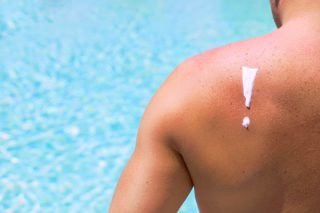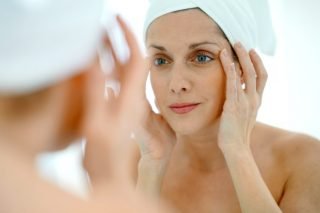All the different ‘anti-aging’ ingredients that skincare brands say are the best can get very confusing. You may have specific questions like whether to use retinol on certain skin types or what antioxidants are and how they work.
There is no single wonder ingredient to combat aging. The best solution is to use a combination of ingredients that are applied regularly to the skin both in the morning and evening after cleansing.
Anti-aging superhero products
Our skin needs a certain core of ingredients or products to fight against aging, and a mix of any or all of these should be considered as a part of a regular routine.
Sunscreen
I am a firm believer in using an SPF 30 or higher, so if your moisturizer’s SPF is sitting around 20 SPF, then boost the skin’s defense by adding sunscreen to your skincare regime. One of the most common replies I get from patients is that sunscreens make them feel greasy, interfere with makeup, or even leave a white cast. The solution to this is to get samples of the different sunscreens and use them till you find the one that suits your skin and preferences.

Kaspars Grinvalds/Shutterstock
Our biggest enemy when it comes to aging skin is UV damage, so your first priority should be to apply sunscreen every morning. Research has shown that not only will it help with combating aging, but you can expect to see an improvement in pigmentation and glow to your skin for daily use.
Exfoliants
As we age our ability to get rid of the dead outer layer of skin cells is dramatically reduced. This leaves us with a rough or textured skin surface. Furthermore, a dull and sallow complexion starts to appear and, with time, wrinkles appear worse, and we may even have dry areas visible on the skin surface.
Exfoliants are used to remove the dead outer layer of skin cells, which improves the penetration of skincare products. Alpha-hydroxy acid (AHA) and Beta hydroxy acid (BHA) have also been shown to stimulate collagen and elastin production.
Antioxidants
These ingredients are a must-have in any skincare regime, as they have been shown to have multiple benefits. They reduce inflammation, repair and restore the skin against free radicle damage, and defend against environmental stress. They also help the skin build more collagen, increase its ability to heal itself, and help fight sun damage.
Cell communicating ingredients
The skin is an intricate network of cells engaged in various levels of communication at all times. The prevalent molecules responsible for this communication are cytokines. Cytokines are proteins, or peptides, that function as biological messengers.

goodluz/shutterstock
Cell-communicating ingredients indicate to your skin cells that it is time to start generating healthier younger skin cells. In doing so, you prevent wrinkles and reduce the appearance of existing wrinkles. The most commonly used cell-communicating ingredients are retinoids, peptides, niacinamide and ceramides.
Skin identical substances
A product is called “skin identical” if it is naturally occurring in the skin. Skin identical ingredients are important because they are our skin’s repairing ingredients. They tend to improve and target the substances between skin cells known as the intercellular matrix. This helps to keep skin cells connected and helps to maintain the skin’s fundamental external structure.
Skin identical ingredients in the outermost layer of the skin include ceramides, fatty acids, and cholesterol. All of these help to keep your skin looking young and radiant.
The next layer of your skin is the layer that is able to retain moisture. The most important skin-identical ingredients for this layer include hyaluronic acid, glycerin, and lecithin.
Bottom line
By using products with a combination of the above ingredients we are literally getting the best of the best onto our skins. All research so far indicates that these are truly the superhero anti-ageing ingredients for our skin care regime.
Visit www.skinmiles.com and sign up for a free Face2Face Assessment. You will receive personal recommendations from Dr Nikolic for your skin type or skin concern.



![women [longevity live]](https://longevitylive.com/wp-content/uploads/2020/01/photo-of-women-walking-down-the-street-1116984-100x100.jpg)










